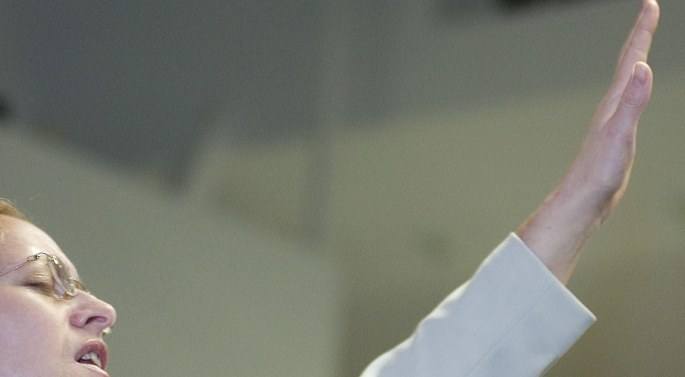Neo-Pentecostalism
 People like me, and probably like most readers of this blog, who come from a literate background in which articulate speech is taken for granted, need to remind themselves that this is not the way all children are brought up or educated: at the extreme, where poverty and a precarious physical environment are the rule, and where life itself is sometimes threatened by torrential storms and mudslides, the daily routine of women trying to keep the family fed and clothed, too often punctuated by quarrels and worse over money and alcohol with their fleeting partners and wayward sons, is not one which encourages children to speak at all in sentences, or to have much contact with the written word, let alone with a text. Life on a very low income is rarely one in which people are able to articulate thoughts of their own.
People like me, and probably like most readers of this blog, who come from a literate background in which articulate speech is taken for granted, need to remind themselves that this is not the way all children are brought up or educated: at the extreme, where poverty and a precarious physical environment are the rule, and where life itself is sometimes threatened by torrential storms and mudslides, the daily routine of women trying to keep the family fed and clothed, too often punctuated by quarrels and worse over money and alcohol with their fleeting partners and wayward sons, is not one which encourages children to speak at all in sentences, or to have much contact with the written word, let alone with a text. Life on a very low income is rarely one in which people are able to articulate thoughts of their own.
But my old friend Bila Sorj, of the Institute of Philosophy and Social Sciences of the Federal University of Rio (IFICHS), said something which struck me forcibly about her evangélico students, who seem to be prominent among those who come from lower-income backgrounds: she said they know how to speak, and speak in public, and they are used to reading, because their preachers use the Bible as a constant source of stories, cautionary tales, fables and inspiration. We do not know how much time and effort evangélicos spend actually reading the Bible, but clearly there is among them a veneration of the written word which sets them apart in their neighbourhoods. Sunday school is a standard feature of life among the Pentecostals who attend small neighbourhood chapels, and one does not have to spend much time in churches to witness – and witnessing is definitely the name – how they deploy what they themselves call the ‘gift of the word’. The church is a place where even the humblest and the most timid are entitled to speak out loud, and that in some cases must be a major psychological breakthrough. Later, if they reach university, it will serve them well, even if, as another professor recounted, they remonstrate with a lecture on evolution!
The Brazilian elite have for many years been struggling to come to terms with the evangélico, or Pentecostal, phenomenon, which now seems to account for about one fifth of the population: between the Censuses of 2000 and 2010 they grew from 15.4% to 22.2% – from 26 million to 42 million. It is interesting to observe that this massive socio-cultural change seems to cause them more discomfort than the country’s moderate – and perhaps over-celebrated – redistribution of income, rising from almost the most unequal country in the world to… 15th from the bottom (yes, 15th…). (For more details go to the UN’s recent Human Development Report.) Yet the redistribution is surely affecting their wellbeing more, if only a little.
Members of the elite seem to have two sorts of reactions to Pentecostalism. For some it is nothing but a money-making machine built on the gullibility of the uneducated – an attitude which underlies much comment in the opinion-forming press. And it is indeed true that in certain sorts of churches the pressure on the congregation to donate and donate and donate – ‘even what you do not have’ – is quite shocking.
For others, Pentecostalism is to be admired because it encourages families to form and keep together, to renounce or avoid violence, drugs and alcohol, and it fosters a more austere work ethic. No wonder one hears of employers who prefer to hire them, notably as domestic servants.
These contrasts reflect a divergence: on one hand the heritage of the classic, respectful Pentecostalism of small chapels and storefront meeting rooms preaching clean living and social respectability and creating community and fraternity among its followers, and one the other the vast neo-Pentecostal churches which operate globally and build monumental temples. The latter seem to have as their aim to displace the Catholic church, gaining space in the public imagination, occupying prominent sites, operating TV and cable networks, and, in Brazil, penetrating the Congress where their caucus now numbers about 60. They also revel in creating scandals with shameless political incorrectness on the subject of homosexuality. Recently one of their Congressmen, Marco Feliciano, who regards homosexuality as a sickness and persists in saying so, was elected Chair of the Human Rights Commission of the Chamber of Deputies, provoking a wave of protest from an array of NGOs, social movements, gay rights activists and so on. I suspect that for every vote lost there was a vote gained in this noisy row. (The protest was justified, but should also have been directed at the labyrinthine system of inter-party and interpersonal deals which govern the allocation of such positions in Congress. The other parties stood by and seemed unperturbed.)
 The grandiose neo-Pentecostal temples seem to represent or reflect the ‘emerging’ classes, announcing their arrival to the world saying , here we are you cannot ignore us’ and also ‘yes, we can’ – encouraged by the empowering rhetoric of their pastors who hammer away at precisely that very worldly message: ‘yes you can! yes you can set ambitious goals for yourself!, yes you can have your own car, your own house!’ The risk? That the forces of evil will tempt you and will pave the way to perdition and failure by an illusion of wealth built on dishonesty or lies – not least involvement in drug trafficking. The price? Implicitly, give generously to the church, and, so long as you do your bit, the church will protect you from the forces of evil.
The grandiose neo-Pentecostal temples seem to represent or reflect the ‘emerging’ classes, announcing their arrival to the world saying , here we are you cannot ignore us’ and also ‘yes, we can’ – encouraged by the empowering rhetoric of their pastors who hammer away at precisely that very worldly message: ‘yes you can! yes you can set ambitious goals for yourself!, yes you can have your own car, your own house!’ The risk? That the forces of evil will tempt you and will pave the way to perdition and failure by an illusion of wealth built on dishonesty or lies – not least involvement in drug trafficking. The price? Implicitly, give generously to the church, and, so long as you do your bit, the church will protect you from the forces of evil.
And so they seem to march forward, entering universities, entering Congress, entering the media, joining a wave of massive social change encompassing many spheres of Brazilian society.
And yet there are dark sides … the spectacle, distasteful to many and disgusting to some, of church leaders who seem to run their churches as businesses, generating fabulous wealth for themselves and their close associates and enjoying the tax exemptions due to religious institutions, and the rumours that it is not without reason that many pastors in the churches boast of their past as traffickers. Some people say that, because of the large amount of cash they receive as donations, their churches serve as convenient channels for money laundering. I hope not…


